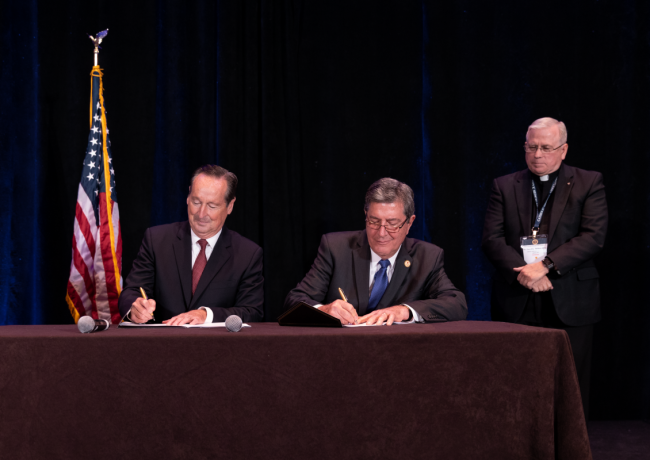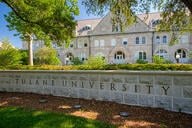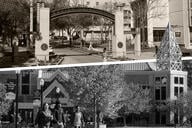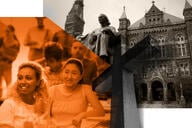You have /5 articles left.
Sign up for a free account or log in.

Benedictine College president Stephen D. Minnis and Catholic Healthcare International founder and president Jere D. Palazzolo sign an agreement to start plans for a new Catholic medical school.
Benedictine College
Officials at Benedictine College, a private Catholic institution in Atchison, Kan., recently announced plans to house a new, independent Catholic medical school on its campus. Part of the goal of the institution is to train physicians in an environment steeped in Catholic values related to contraception, abortion and end-of-life issues.
The initiative, which is expected to cost $120 million, is a partnership with Catholic Healthcare International, an organization that aims “to be a model of Christian healthcare delivery” based on the work of Padre Pio, a Catholic priest and saint who opened a historic hospital in Italy. Catholic Healthcare International signed a collaboration agreement with Benedictine in early September to start planning the proposed medical school, dubbed the St. Padre Pio Institute for the Relief of Suffering, School of Osteopathic Medicine. It will be independently run and financed.
The hope is for the medical school to gain accreditation and open its doors by 2026; it hopes to eventually enroll about 180 students annually who will earn a doctor of osteopathic medicine degree and take coursework in and potentially earn master’s degrees in Catholic bioethics.
Stephen D. Minnis, president of Benedictine, said he believes “this will be one of the most faithful Catholic medical schools in the world.”
“It is vital to train future doctors at a place like Benedictine College that understands the essential role of faith and morality in the sciences,” Minnis said in a press release. “The campus culture of community, faith, and scholarship that we have worked so hard to create will be the perfect home for the proposed Padre Pio medical school at Benedictine College.”
The announcement comes not long after the U.S. Supreme Court overturned Roe v. Wade this past summer, ending federally protection for abortion rights and prompting student protests across the country. The decision elicited statements from campus leaders that ranged from denunciatory to celebratory to carefully neutral, and it plunged colleges and universities into uncharted legal waters on how to serve students who may want to terminate pregnancies while adhering to a patchwork of new state laws. The University of Idaho, for example, advised faculty members to refrain from sharing public opinions on the issue to avoid possible legal problems.
The people behind the new medical school, however, are clear about where the school’s policies will stand on abortion and forms of contraception, such as the morning-after pill, which Catholic doctrine views as a method for ending a life.
“Even if it’s in 24 hours, if it’s preventing the implantation of a fertilized ovum, under the Catholic doctrine, that’s considered a person,” said George Mychaskiw, the founding president and CEO of the future of the school. “And you can use whatever euphemism you want, whether you say—it’s a clump of cells, an embryo, a fetus or a baby … It’s undeniably two things under the Catholic view: It’s undeniably alive. It’s undeniably human. It’s not kittens. It’s not chicken eggs.”
Mychaskiw, who is currently professor and vice chair of anesthesiology and director of perioperative services at the Oschner Louisiana State University Health Science Center, said there are nine Catholic medical schools in the United States, but they’re “nominally Catholic,” essentially secular institutions under a religiously affiliated college or university.
The St. Padre Pio Institute will be the first medical school in the country to adhere to “Ex corde Ecclesiae,” an ordinance issued by the late pope Saint John Paul II that governs what’s expected of Catholic colleges and universities. As a result, the medical school will have a majority Catholic faculty, Catholic lay leaders and a Catholic Board of Directors. Instructors will also be required to sign a “pledge of loyalty to Catholic principles,” which includes “life issues,” such as continuing to give nutrition and fluids to terminal patients as part of palliative care and not performing abortions.
He noted that these restrictions don’t mean students won’t be taught about abortion from a scientific perspective, but they’ll also be taught the Catholic perspective on the subject and taught to counsel patients on carrying pregnancies to term and considering options such as adoption. Students will also learn Catholic doctrine on which contraceptive methods are acceptable and which are not.
“They’ll understand what abortion is, how they’re done, what medical issues are around abortion and complications,” he said. “But the school will also have the firm moral, Catholic position on the acceptability of abortion and any instances where it’s involved. So, it does take a moral position on that, but it doesn’t shy from actually teaching about the science and technology.”
Carol Hogue, professor emerita of epidemiology and Jules and Uldeen Terry Professor Emerita of Maternal and Child Health at Emory University, expressed concern that training physicians in a rigid Catholic approach to medicine could contribute to maternal mortality.
“From the public health perspective, maternal mortality is the sixth leading cause of death among women age 16 to 34, and much of what Catholic doctrine forbids in Catholic hospitals speaks directly to saving women’s lives who are pregnant and to avoiding pregnancy with effective contraceptives when they don’t want to be pregnant,” she said. “I want to prevent lives from being lost, and they do not. Abortion is only a small part of it.”
Hogue pointed out that there have been lawsuits against Catholic hospitals for not providing timely abortions to women with ectopic pregnancies and other potentially fatal pregnancy complications.
Daniel Sulmasy, director of the Kennedy Institute of Ethics and a professor of medicine and philosophy at Georgetown University, a Jesuit institution, said he sees the new medical school as a positive development. He believes a faith-based medical education can foster a “real sense of calling and mission” in future doctors and train them to pay more attention the spiritual beliefs and needs of patients.
He also noted that the student body at St. Padre Pio Institute will likely differ from most Catholic medical schools, which tend to attract high percentages of nonreligious students and hold a range of perspectives on issues like abortion. He said medical students at these institutions often train in Catholic teaching hospitals that adhere to Catholic principles and are taught Catholic perspectives on medical issues, but they’re also presented with secular perspectives, and robust discussions frequently happen in the classroom.
For example, Sulmasy teaches a medical ethics course that includes the philosophy of Peter Singer, a bioethics scholar who argues that abortion is ethical. Sulmasy sees Georgetown as a place where students who are both in favor of and opposed to abortion rights can comfortably air their views and have a “dialogue that’s actually refreshing and open, where people are actually talking respectfully in ways I think can’t happen about abortion in secular institutions.”
He believes even for a mostly antiabortion student body, Catholic medical ethics has to be taught “in dialogue with opposing viewpoints, if for the only reason that if you want people to believe it, they have to be able to defend it,” he said.
Mychaskiw hopes to train physicians to work at Catholic hospitals across the country that would benefit from having doctors who are “culturally comfortable” in Catholic settings and familiar with the restrictions they follow. But he also foresees some of the students going on to work in secular hospitals. He believes training medical professionals, with a focus on “high-quality” academics but also Catholic philosophical underpinnings, is its own form of religious outreach.
“Our view of evangelization is that our physicians and their practice through the care and respect of every human life and dignity of life will then, through their work, serve as an example of how physicians in the Catholic tradition care for human beings,” he said. “We’re not here to stand on the street corner and preach. We’re here to take care of the sick and suffering, and through that, demonstrate, live out our faith.
“Health care is short all over,” he added. “I think, at the end of the day, whatever hospital I’m in, I want a physician that really cares for me as a human, as a patient, and respects my life and dignity.”





